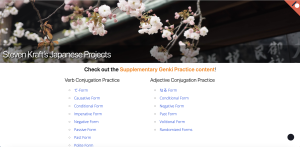Review by forms
External resources for practicing conjugation
https://steven-kraft.com/projects/japanese/
te-form, causative, conditional, imperative, negative, passive, past, polite, potential, provisional, volitional, etc.

http://baileysnyder.com/jconj/
A webpage to practice typing conjugation (Credit: bailysynder.com)
Past tense, present (non-past) tense, and te-form.

Verb Conjugation Charts
| I (a) | II (i) | III (u) | IV (e) | V (o) | ||
| Verb type | Informal
Negative Nonpast |
Formal
Nonpast (masu form) |
Informal nonpast (citation form) | Provisional | Let’s Verb | |
| ACT | – | 7-3 | 2-1 | 7-1 | 16-2 | 10-1 |
| 見る’see’
miru |
RU | 見ない
minai |
見ます
mimasu |
見る
miru |
見れば
mireba |
見よう
miyoo |
| 始める ‘begin something’
hajimeru |
RU | 始めない
hajimenai |
始めます
hajimemasu |
始める
hajimeru |
始めれば
hajimereba |
始めよう
hajimeyoo |
| 変える ‘change’
kaeru |
RU | 変えない
kaenai |
変えます
kaemasu |
変える
kaeru |
変えれば
kaereba |
変えよう
kaeyoo |
| 待つ ‘wait’
matsu |
U | 待たない
matanai |
待ちます
machimasu |
待つ
matsu |
待てば
mateba |
待とう
matoo |
| 作る ‘make’
tsukuru |
U | 作らない
tsukuranai |
作ります
tsukurimasu |
作る
tsukuru |
作れば
tsukureba |
作ろう
tsukuroo |
| ある ‘exist (inanimate’
aru |
U | *ない
nai |
あります
arimasu |
ある
aru |
あれば
areba |
あろう
aroo |
| 帰る ‘return (home)’
kaeru |
U | 帰らない
kaeranai |
帰ります
kaerimasu |
帰る
kaeru |
帰れば
kaereba |
帰ろう
kaeroo |
| 言う ‘say’
iu |
U | 言わない
iwanai |
言います
iimasu |
言う
iu |
言えば
ieba |
言おう
ioo |
| 行く ‘go’
iku |
U | 行かない
ikanai |
行きます
ikimasu |
行く
iku |
行けば
ikeba |
行こう
ikoo |
| 書く ‘write’
kaku |
U | 書かない
kakanai |
書きます
kakimasu |
書く
kaku |
書けば
kakeba |
書こう
kakoo |
| 急ぐ ‘hurry’
isogu |
U | 急がない
isoganai |
急ぎます
isogimasu |
急ぐ
isogu |
急げば
isogeba |
急ごう
isogoo |
| 喜ぶ ‘be delighted’
yorokobu |
U | 喜ばない
yorokobanai |
喜びます
yorokobimasu |
喜ぶ
yorokobu |
喜べば
yorokobeba |
喜ぼう
yorokoboo |
| 飲む ‘drink’
nomu |
U | 飲まない
nomanai |
飲みます
nomimasu |
飲む
nomu |
飲めば
nomeba |
飲もう
nomoo |
| 死ぬ ‘die’
shinu |
U | 死なない
shinanai |
死にます
shinimasu |
死ぬ
shinu |
死ねば
shineba |
死のう
shinoo |
| 話す ‘talk’
hanasu |
U | 話さない
hanasanai |
話します
hanashimasu |
話す
hanasu |
話せば
hanaseba |
話そう
hanasoo |
| いらっしゃる ‘be (honorific form of いる)’
irassharu |
ARU | いらっしゃらない
irassharanai |
いらっしゃいます
irasshaimasu |
いらっしゃる
irassharu |
いらっしゃれば
irasshareba |
いらっしゃろう
irassharoo |
| する ‘do’
suru |
Irregular | しない
shinai |
します
shimasu |
する
suru |
すれば
sureba |
しよう
shiyoo |
| 来る ‘come’
kuru |
Irregular | 来ない
konai |
来ます
kimasu |
来る
kuru |
来れば
kureba |
来よう
koyoo |
continued
| Verb type | te-form | Informal
past |
|
| ACT | — | 5-1 | |
| 見る’see’
miru |
RU | 見て
mite |
見た
mita |
| 始める ‘begin something’
hajimeru |
RU | 始めて
hajimete |
始めた
hajimeta |
| 変える ‘change’
kaeru |
RU | 変えて
kaete |
変えた
kaeta |
| 待つ ‘wait’
matsu |
U
(-tsu) |
待って
matte |
待った
matta |
| 作る ‘make’
tsukuru |
U
(-ru) |
作って
tsukutte |
作った
tsukutta |
| ある ‘exist (inanimate’
aru |
U
(-ru) |
あって
atte |
あった
atta |
| 帰る ‘return (home)’
kaeru |
U
(-ru) |
帰って
kaette |
帰った
kaetta |
| 言う ‘say’
iu |
U
(-u) |
言って
itte |
言った
itta |
| 行く ‘go’
iku |
U
(-ku) |
*行って
itte |
行った
itta |
| 書く ‘write’
kaku |
U
(-ku) |
書いて
kaite |
書いた
kaita |
| 急ぐ ‘hurry’
isogu |
U
(-gu) |
急いで
isoide |
急いだ
isoida |
| 喜ぶ ‘be delighted’
yorokobu |
U
(-bu) |
喜んで
yorokonde |
喜んだ
yorokonda |
| 飲む ‘drink’
nomu |
U
(-mu) |
飲んで
nonde |
飲んだ
nonda |
| 死ぬ ‘die’
shinu |
U
(-nu) |
死んで
shinde |
死んだ
shinda |
| 話す ‘talk’
hanasu |
U
(-su) |
話して
hanashite |
話した
hanashita |
| いらっしゃる ‘be (honorific form of いる)’
irassharu |
ARU | いらっしゃって
irasshatte |
いらっしゃった
irasshatta |
| する ‘do’
suru |
Irregular | して
shite |
した
shita |
| 来る ‘come’
kuru |
Irregular | 来て
kite |
来た
kita |
continued
| Verb type | (Honorific)
Passive |
causative | potential | imperative | |
|
ACT |
– | (13-1) | 17-3
23-3 (causative passive) |
15-1 | |
| 見る’see’
miru |
RU | 見られる
mirareru |
見させる
misaseru |
見(ら)れる
mirareru |
見ろ
miro |
| 始める ‘begin something’
hajimeru |
RU | 始められる
hajimerareru |
始めさせる
hajimesaseru |
始め(ら)れる
hajime(ra)reru |
始めろ
hajimero |
| 変える ‘change’
kaeru |
RU | 変えられる
kaerareru |
変えさせる
kaesaseru |
変え(ら)れる
kae(ra)reru |
変えろ
kaero |
| 待つ ‘wait’
matsu |
U | 待たれる
matareru |
待たせる
mataseru |
待てる
materu |
待て
mate |
| 作る ‘make’
tsukuru |
U | 作られる
tsukurareru |
作らせる
tsukuraseru |
作れる
tsukureru |
作れ
tsukure |
| ある ‘exist (inanimate’
aru |
U | あられる
arareru |
― | ― | あれ
are |
| 帰る ‘return (home)’
kaeru |
U | 帰られる
kaerareru |
帰らせる
kaeraseru |
帰れる
kaereru |
帰れ
kaere |
| 言う ‘say’
iu |
U | 言われる
iwareru |
言わせる
iwaseru |
言える
ieru |
言え
ie |
| 行く ‘go’
iku |
U | 行かれる
ikareru |
行かせる
ikaseru |
行ける
ikeru |
行け
ike |
| 書く ‘write’
kaku |
U | 書かれる
kakareru |
書かせる
kakaseru |
書ける
kakeru |
書け
kake |
| 急ぐ ‘hurry’
isogu |
U | 急がれる
isogareru |
急がせる
isogaseru |
急げる
isogeru |
急げ
isoge |
| 喜ぶ ‘be delighted’
yorokobu |
U | 喜ばれる
yorokobareru |
喜ばせる
yorokobaseru |
喜べる
yorokoberu |
喜べ
yorokobe |
| 飲む ‘drink’
nomu |
U | 飲まれる
nomareru |
飲ませる
nomaseru |
飲める
nomeru |
飲め
nome |
| 死ぬ ‘die’
shinu |
U | 死なれる
shinareru |
死なせる
shinaseru |
死ねる
shineru |
死ね
shine |
| 話す ‘talk’
hanasu |
U | 話される
hanasareru |
話させる
hanasaseru |
話せる
hanaseru |
話せ
hanase |
| いらっしゃる ‘be (honorific form of いる)’
irassharu |
ARU | いらっしゃられる
irassharareru |
いらっしゃらせる
irassharaseru |
いらっしゃれる
irasshareru |
いらっしゃい
irasshai |
| する ‘do’
suru |
Irregular | される
sareru |
させる
saseru |
できる
dekiru |
しろ
shiro |
| 来る ‘come’
kuru |
Irregular | 来られる
korareru |
来させる
kosaseru |
来(ら)れる
korareru |
来い
koi |
Adjective Conjugation chart
|
Formal |
affirmative |
negative |
|
Non-past |
Adj stem + i desu | Adj stem + ku nai (desu)
Adj stem + ku arimasen |
|
2-1 (BTS 1) |
||
|
Past |
Adj stem + katta desu | Adj stem + ku nakatta (desu) |
|
4-1 (BTS 1) |
||
| Informal | affirmative |
negative |
|
Non-past |
Adj stem + i | Adj stem + ku nai |
| 2-3 (BTS 15) |
2-6 (BTS 25) |
|
|
Past |
Adj stem + katta | Adj stem + ku nakatta |
|
4-1 (BTS 1) |
||
| te form | affirmative |
negative |
|
Non-past |
Adj stem + ku + te | Adj stem + ku naku + te |
|
5-1 (BTS 1) |
||
Noun desu Conjugation charts
|
Formal |
affirmative | negative |
|
Non-past
|
N desu | N ja nai desu
N ja arimasen |
|
2-1 (BTS 1) |
||
|
Past
|
N deshita |
N ja nakatta desu N ja arimasen deshita |
|
4-1 (BTS 1) |
||
|
Informal |
affirmative | negative |
|
Non-past |
N (drop desu) | N ja nai |
|
2-5 (BTS 18) |
||
|
N da |
||
|
3-4 (BTS 18) |
2-6 (BTS 25) |
|
| Past | N datta |
N ja nakatta |
|
4-3 (BTS 14) |
||
|
te form |
affirmative | negative |
|
Non-past |
N + de |
N janakute |
|
5-1 (BTS 1) |
||
Sentence Particles at a glance
| Sentence particles | Functions | NOTES |
| か | 1. Question marker (2-1 BTS 3)
2. Embedded yes/no questions (12-2 BTS 4) 3. Embedded information questions (12-3 BTS 6) |
As a phrase particle:
1. Either X or Y (6-6 BTS 23) |
| ね | 1. Confirmation (2-1 BTS 3)
2. Rising vs. falling intonation (2-3 BTS 14) |
|
| よ | 1. Certainty/new information (2-2 BTS 6) | |
| ねえ | 1. Assuming shared attitude/opinion from others (2-3 BTS 3; 2-6 BTS 23, 24)
|
|
| けど
(けれども)
|
1. Contrast/Background information (2-4 BTS 16) | |
| が | 1. Contrast/Background information (2-4 BTS 16) | As a phrase particle
1. Subject marker (4-3 BTS 13) 2. Object marker: Double-ga sentences (4-6 BTS 27) |
| なあ | 2. Shared agreement (2-6 BTS 23, 24)
|
|
| かねえ | 1. Shared question (Multiple Sentence Particles かなあ、かねえ (2-7 BTS 24) | |
| かなあ | 1. Shared question (self-directed) (Multiple Sentence Particles かなあ、かねえ (2-7 BTS 24) | |
| よね | 1. Multiple particle: よね (3-6 BTS 33) | |
| から
|
1. Reasons (5-5 BTS 12)
2. Phrase particle + です (4-4 BTS 23; 6-2 BTS 5) 3. 〜んだから ‘Because, as you must surely know’ (8-2 BTS 5) 4. Specifying order of events: Verb 〜てから (9-6 BTS 15) 5. だから as a discourse connector (21-6 BTS 12) |
As a phrase particle
1. Origin/source (4-4 BTS 22) |
| し | 1. Sentence + し: 教えるの好きだし (9-3 BTS 9) | |
| さ | 1. (informal) topic marker (12-3 BTS 7)
2. Assertion/new information (12-3 BTS 7) |
|
| わ
|
1. Emphasis (Rising intonation—feminine) (20-6 BTS 8)
2. Emphasis (Falling intonation—both) (20-6 BTS 8) |
|
| ぞ | 1. Force or emphasis (21-4 BTS 7) | |
| かしら | 1. Wondering (22-2 BTS 6) | |
| ぜ | 1. Force or emphasis (blunt) (23-2 BTS 4) | |
| な | 1. Negative imperative: Verb + な (23-2 BTS2) | As a phrase particle
1. Nouns modifying Nouns: Nの・なN |
Phrase Particles at a glance
| Phrase particle | Functions | Relevant expressions |
| は
|
1. Contrast: Noun Xは? (2-6 BTS 22)
2. Topic: As for X (3-2 BTS 7) |
|
| と | 1. Connecting Nouns ‘and’ and ‘with’ (3-2 BTS 10)
2. Comparison: Noun + と + Sentence (6-6 BTS 25) 3. Quotation with と・(っ)て (7-3 BTS 9) |
1. Xと一緒に ‘together with’ (3-3 BTS 17)
2. Name + といいます・おっしゃいます・申します (6-2 BTS 6) 3. Noun + と + Sentence (6-6 BTS 25) 4. Sentenceと思う (7-4 BTS 12) 5. Xと・に代わる (11-1 BTS 3) 6. と・って言うか (18-3 BTS 9) 7. 〜としては・も (19-1 BTS 3) |
| って | 1. Topic (3-1 BTS 4)
2. Quotation with と・(っ)て (7-3 BTS 9) |
1. と・って言うか (18-3 BTS 9) |
| の | 1. の as a Connecter (3-2 BTS 2)
2. の as a Noun (3-6 BTS 29) |
1. Nouns modifying Nouns: Nの・なN (3-1 BTS 2)
2. Noun + のこと ‘a matter of noun’ (3-1 BTS 5) 3. Sentence + の (9-1 BTS 2) |
| に
|
1. Timeに (3-4 BTS 20)
2. Location にあります・います (3-6 BTS 30) 3. Relative time (4-4 BTS 20) 4. Place/goal (5-4 BTS 8) 5. Decision: カレーにします (6-6 BTS 28) 6. Purpose (9-2 BTS 5) (A Verb stem+ に + motion verb) 7. Giving verbs 8. Marks the person from whom you get something: Verbs of receiving: もらう・いただく and 〜てもらう・いただく (12-1 BTS 4 BTS 9) 9. Marks the person who is made or allowed to do something (17-3 BTS 5 Causative Verb form: させる) 10. Marks the original subject: Passive verbs (18-1 BTS 1) |
1. Change of state: noun + になります・なりました (6-2 BTS 7)
2. Xと・に代わる (11-1 BTS 3) 3. 〜ことにする (11-3 BTS 7) 4. 朝に強い・弱い (12-4 BTS 12) 5. Nounにしては・も (18-1 BTS 2) |
| で
|
1. Place [of Activity]で (3-4 BTS 15)
2. Means (5-4 BTS 9) |
1. Noun + です in the 〜て form (5-1 BTS 1b)
2. で、 at the Beginning of a Sentence (12-3 BTS 8) 3. Nounでも (14-6 BTS 19) |
| も | 1. Additional [also, too] (3-6 BTS 31)
|
1. Question word + も(6-6 BTS 22)
2. All or nothing: Quantity + も + negative or affirmative Sentences (9-6 BTS 17) |
| だけ | 1. Xだけ (4-2 BTS 9) | As a sentence particle
1. Sentence + だけ (17-6 BTS 6) Sentence + だけ〜てみる (20-3 BTS 7) |
| とか
|
1. Listing (4-2 BTS 8)
2. Multiple particle とかも(4-2 BTS 10) |
Other expressions
1. 何とかスーパー (7-6 BTS 19) 2. なんか (13-1BTS 2)
As a sentence particle 1. Sentenceとか (10-6 BTS 11) |
| が | 1. Subject marker (4-3 BTS 13)
2. Object marker: Double-ga sentences (4-6 BTS 27) |
1. Describing people: 背が高い・背が低い人 (6-3 BTS 13) |
| から
|
1. Origin/source (4-4 BTS 22)
2. Marks the person from whom you get something: Verbs of receiving: もらう・いただく and 〜てもらう・いただく |
1. Phrase particle + です (4-4 BTS 23)
2. Phrase particle + です (6-2 BTS 5)
As a clausal particle 3. Reasons (5-5 BTS 12) 4. Phrase particle + です (4-4 BTS 23; 6-2 BTS 5) 5. 〜んだから ‘Because, as you must surely know’ (8-2 BTS 5) 6. Specifying order of events: Verb 〜てから (9-6 BTS 15) 7. だから as a discourse connector (21-6 BTS 12) |
| まで
|
1. Origin/source (4-4 BTS 22)
2. Time までに (5-5 BTS 13) |
1. Phrase particle + です (4-4 BTS 23)
2. Phrase particle + です (6-2 BTS 5) |
| を | 1. Object (4-5 BTS 24)
2. Locationを(7-6 BTS 17) |
|
| へ
|
1. Place/goal (5-4 BTS 8)
|
|
| より | 1. Compared to: Comparison of two items (6-6 BTS 24) | As a sentence particle
1. Comparisons of two activities (10-6 BTS 12) |
| ほど | 1. As much as: Comparison of two items (6-6 BTS 24)
2. [quantity] + ほど (about, as many as) (19-6) |
As a sentence particle
1. 〜れば〜ほど (20-5 BTS 9) |
| か
|
1. Either X or Y (6-6 BTS 23) | As a sentence particle
1. Question marker (2-1 BTS 3) 2. Multiple Sentence Particles かなあ、かねえ (2-7 BTS 24) 3. Multiple particle: よね (3-6 BTS 33)
4. Embedded yes/no questions (12-2 BTS 4)
5. Embedded information questions (12-3 BTS 6) |
| なんか | 1. For example (casual), something/anything like that (13-1 BTS 2) | |
| しか | 1. しか + Negative (13-1 BTS 3) | As a sentence particle
1. しか + Negative (13-1 BTS 3) 2. Non-past Sentence + しかない (18-2 BTS 5) |
| でも | 1. Nounでも (14-6 BTS 19)
2. 一度Question Word + Phrase Particle + でも (15-4 BTS 11) 3. たとえNounでも (18-6 BTS 13) |
(At the beginning of a sentence) But, however, and yet (5-1 Special expression)
Te-form of です 1. Nounでも (5-1 BTS 2b) 2. XでもYでも Whether it’s X or Y (5-1 Special expression) |
| や | 1. Things like (17-7R BTL 1) | |
| ばかり | 2. Exclusivity: Nばかり・ばっかり (22-2 BTS 3) | As a sentence particle
1. Past Sentenceばかり・ばっかり (22-1 BTS 1) 2. Non-past sentence + ばかり・ばっかり (22-4 BTS 4) 3. 〜てばかり・ばっかり (22-6 BTS 12) |
| さえ | 1. If and only if (22-3 BTS 8) | |
| など | 1. And the like, et cetera (22-2 BTS 5) |
![]()

